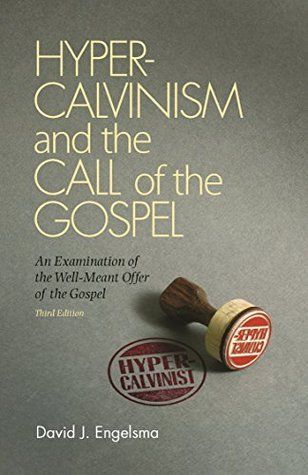
PART 2
Hyper-calvinism and the call of the gospel by David J. Engelsma (Reformed Free Publishing Association, 216 pages) is the greatly enlarged edition of a book which seeks to defend the teachings of a small American denomination, the Protestant Reformed Churches (PRC), and its UK counterpart, the British Reformed Fellowship. However, ‘defend’ is probably not the correct word, as they are very much on the attack! They maintain that they represent the pure Reformed faith and that those who believe in ‘the well-meant offer of the gospel are on the way to Arminianism.
The PRC denomination was founded in 1924-5 by Herman Hoeksema, formerly a minister of the Christian Reformed Church. The PRC denies ‘common grace’ and ‘the well-meant offer of the gospel’, which has led to the charge of hyper calvinism. This Engelsma denies, attacking others whom he regards as real hyper calvinists.
The call of the gospel
Engelsma begins from the New Testament doctrine of the call. He distinguishes correctly between the general call of the gospel, as used by Christ, and the effectual call, as used by Paul. He argues strongly, and rightly, from Matthew 22:14 – ‘many are called but few are chosen’ – that the external call must go to all indiscriminately, although only some are elect. Then, however, he says that the call as Paul uses the term, the effectual call, is only f or the elect, not merely in the sense that it is made effective ‘by the secret operation of the Holy Spirit in the heart of the elect’ (p.102), but that it is different in content.
However, in Matthew 22 all the people receive the same invitation; if the gospel is tender and comforting for the elect hearer, it must be the same for the others, if they will only hear it. This he denies, limiting ‘the tender, comforting aspect of the call of the gospel’ to ‘those who labour and are heavy laden (Matthew 11:28)’, (p.86), thus advocating preaching the good news only to ‘sensible sinners’, just like those he condemns.
The well-meant offer
The PRC’s teaching on ‘the well-meant offer’ is widely regarded as a departure from the orthodox Reformed faith. (See ‘The free offer of the gospel’ by Prof. John Murray, Collected Writings, Vol. 4, p.ll3ff, with which Engelsma explicitly disagrees.) The issue for Engelsma is not whether all men are responsible to repent and believe, but whether God sincerely desires all men to come and to be saved, whether the gospel invitation to all to come to Christ is a sincere (well-meant) offer of salvation or not. For him it is not such an offer, since that would imply both a universal atonement and frustration on the part of God. Engelsma argues that God cannot desire the salvation of the non-elect, because he has not chosen them and will not regenerate them. Therefore, he does not offer them salvation. However, he quite happily writes that ‘God calls men to come to the feast of salvation prepared through Jesus’ death and resurrection… Their’s is the sin of sins: despising Christ presented to them in the gospel’, (p.20). In what sense is it ‘prepared’ and how have they ‘despised’ it, if it is not for them at all?

This question is not to be settled by ‘logical’ deductions from a theological premise, such as Engelsma uses, but from the Scriptures, which tell us what God actually does, e.g. ‘I have no pleasure in the death of the wicked; but that the wicked turn from his way and live’ (Ezekiel 33:11) and ‘The Lord…is longsuffering to us-ward, not willing that any should perish, but that all should come to repentance’ (2 Peter 3:9). (See Murray’s essay referred to above for proof that ‘all’ means all men, not just the elect.)
Conditions
Part of the debate is about whether salvation is conditional. Of course it all depends on what you mean by a condition. Engelsma produces his own definition and then denounces his opponents on that basis. ‘A condition of salvation is an act that man must and can perform of himself and an act upon which salvation depends.’ But this is a man of straw. We have never asserted that man must and can repent or believe of himself; obtaining eternal life does not mean ‘merit’, as he claims (p. 135).
A condition, biblically speaking, is simply an ‘unless’ or an ‘except’, that without which the salvation will not be enjoyed. See Luke 13:3,5: ‘Except ye repent ye shall all likewise perish’ ;and Matthew 18:3: ‘Except ye be converted [lit. turn] and become as little children ye shall not enter into the kingdom of heaven.’The condition must be pressed upon the hearers, not to suggest that their will is the ultimate factor, but as the means that God uses to bring his elect to salvation. Nevertheless turning in repentance and faith is the prerequisite for salvation-one that God himself fulfils in us by his Spirit. Salvation depends on faith, but only as an instrument in the hand of God, not as merit.
The meaning of offer
Engelsma not only denies that God makes a well-meant offer, he denies that the word ‘offer’ should be used at all. He acknowledges that the word occurs in the Canons of the Synod of Dordt, his preferred standard, but resorts to the Latin original to argue that offer only means ‘present’. ‘For what purpose is it presented?’ we must ask. Is it not for acceptance in faith? That is an offer and that is why rejection is ‘the sin of sins’ (p.20).
The Westminster Confession was, of course, written in English so ‘offer’ it is. The words are, ‘He freely offereth unto sinners life and salvation by Jesus Christ, requiring of them faith in him, that they may be saved’ (ch.7). This Engelsma correctly calls Reformed orthodoxy, but then tries to evacuate it of meaning (p. 110). What we are left wish, on Engelsma’s terms, is an insincere offer, a not-well-meant offer. God offers but does not want men to accept. He invites only so that he may condemn them for not coming. Is this good news?
Mystery
Engelsma objects to the introduction of the concept of mystery at this point. He accepts the idea of two wills of God – the decretive will (predestination) and the preceptive will (commands), thus reconciling (in a mystery) God’s planning of the crucifixion with Judas’s responsibility (Matthew 26:24). However, he will not accept a distinction between will of purpose and will of desire (which is the equivalent of his will of command: God wants men not to sin). This, he insists, is a contradiction, not a mystery, but he cannot show why it is different. God forbids something that he has ordained. That is no different from desiring something that you have not decreed should be.
In Romans 2:5 Paul refers to men of ‘hardness and impenitent heart’, i.e. not the elect, whom ‘the goodness of God leadeth…to repentance’. God does not, in fact, lead all such men to repentance, so is it not simply that the intention and design of God’s goodness to all is to lead them to repentance – ‘a constraining influence flowing from the goodness of God which is calculated to bring men to repentance’ (Murray, op.cit. p.128)?
Ambassador
Engelsma insists that he is not ‘unable or unwilling to beseech others to be reconciled to God’ (p.40). But he fails to recognize that according to Paul in 2 Corinthians 5:20 this beseeching is God’s beseeching ‘by us’. If the preacher, who does not know who is elect, is beseeching all, then so is God. The meaning of his words is God’s meaning. Engelsma says that ‘An “offer-man”, if he is consistent, must beg sinners and this disgraceful practice abounds today’ (p.86). However, this ‘disgraceful practice’ is just what Paul describes the ambassador as doing: beseeching and praying (which is begging; the word is the usual one for our praying to God!). Of course, it is possible to do this in the wrong way – putting God in the gutter, forgetting that an ambassador represents a king on his throne-but the word is still beseech. What condescension God shows in this! George Whitefield is a good example of what Paul intended:
‘I offer you salvation this day; the door of mercy is not yet shut. O do not put a slight on infinite love. He only wants you to believe on him, that you might be saved. This, this is all the dear Saviour desires, to make you happy, that you may leave your sins. Let me beseech you to come to Jesus Christ; I invite you all to come to him, and receive him as your Lord and Saviour; he is ready to receive you. I invite you to come to him. He will rejoice and be glad. He calls you by his ministers; O come unto him. He is labouring to bring you back from sin and from Satan unto himself. Open the door of your heart, and the King of glory shall enter in’ (quoted in The Banner of Truth magazine, July 1994, p.21).








